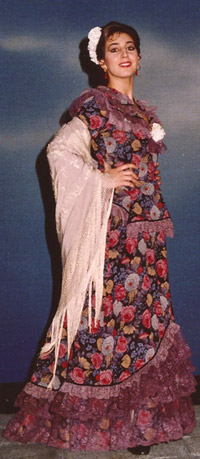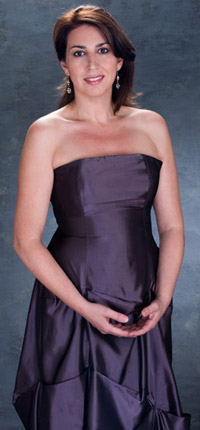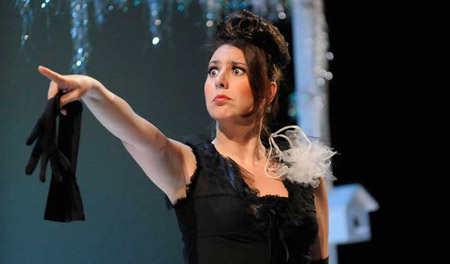|
Interview with... |
|
It’s a rare pleasure to hear such a voice as Lola Casariego’s. We’d spoken several times previously, but not for long enough for me to get to know one of the great singers of Spanish lyric theatre, whose vocal worth is matched by her excellent qualities as an actress.
It was at the Teatro de la Zarzuela in La chulapona where she first piqued my interest. After that I heard her singing, on the same stage, Rossini’s Barber of Seville. Then came other zarzuelas, operas, baroque music, as well as audio and video recordings such as El barberillo de Lavapiés, Goyescas, Los elementos, Acis y Galatea, Júpiter y Semele, El hijo fingido, Agua, azucarillos y aguardiente, Three Portraits with Shadow [ed. CD of music by the Halffters and Bautista] … Her voice has evolved from mezzo soprano to lyric-spinto soprano, a great development for Spanish lyric theatre.
We met for a relaxed conversation at her house, in a room boasting a controlled humidifier – she drank water and covered her shoulders in a light shawl.
 Lola, we all remember Manuela in
La chulapona, your first performance at Teatro de la
Zarzuela.
Lola, we all remember Manuela in
La chulapona, your first performance at Teatro de la
Zarzuela.
I was doing a course in Salzburg when I got asked
to go to a casting at Teatro de la Zarzuela. Miguel Roa said “Lolilla,
the role is yours, so you can start work.” I had doubts whether my
Asturian origins might cause difficulties in playing such a pure
madrileña, but it was not a problem. Everything went as I
dreamt. After that first experience I realized that the stage was my life.
How was your visit to
Edinburgh?
It was a cold August. We reproduced the same
production of La chulapona and had great success. The Edinburgh
public loves music and has great musical knowledge. They applauded to the
rooftops and the press wrote rave reviews for the work as well as my colleagues
and myself.
How do you feel singing works by the
zarzuela composers?
I enjoy everything I can sing, although
I recognize that musical training and experience allow some of them to write
specially well for the voice, as is the case with Sorozábal, Barbieri,
Torroba…
 You risked recording baroque zarzuelas by Literes in
authentic, original versions. What was your motivation?
You risked recording baroque zarzuelas by Literes in
authentic, original versions. What was your motivation?
Eduardo López Banzo, director of the then newly-formed Al Ayre
Español dedicated to the Spanish Baroque – and in particular
the music of Antonio de Literes – saw me in La chulapona and
asked me to sing a principal character in Los elementos with his
group. It was an incredibly high-quality musical group, he did his job with
love and then I myself fell in love with this music. Baroque is a very
demanding style from which you learn a lot.
How do you think of Teatro de la
Zarzuela?
I feel at home here. My first experience was in
the reinforced chorus for a season of opera, then I did some small roles before
my debut as a soloist in La chulapona. After that, Alberto Zedda chose
me to sing in Barber of Seville. This led me to sing opera, more zarzuela,
oratorio, recitals and concerts in various theatres in many countries. As for
zarzuela, there I have also sung Pan y toros, Los diamantes de la
corona… and I hope soon the role of Salud in La vida
breve.
How has your voice evolved? Is your
voice high mezzo, lyric-spinto soprano or dramatic
soprano?
In reality my career has developed in time with
the history of music, from baroque to contemporary music, through classicism,
romanticism, verismo... The vocal character of Salud in La vida
breve revealed to me my spinto capabilities. But really it was
the Argentine tenor Daniel Muñoz who saw the possibilities in the top of
my voice, and during the last five years I’ve been progressing from mezzo
to lyric-spinto soprano, the register that I feel most
comfortable.

You’ve talked about the music
of zarzuela. What do you think of the texts?
True, we speak
about the composer but hardly remember the name of the librettist. Some
librettos are really less good than others, but it’s also true that in
many works the text is important. We must not forget that a large part of
zarzuela is spoken. Thinking about some of the works I’ve played, I
can say that we really enjoyed the verse-dialogue of Los diamantes de la
corona. I also greatly respect the texts of La chulapona
and Pan y toros.
How do you view the current state of
zarzuela?
I have the impression that a major new
reassessment of the genre is beginning. I see openings for a range of singers,
mainly at Teatro de la Zarzuela, and that's a positive sign.
You say that baroque music has
influenced your interpretation of zarzuela?
The baroque
style is very expressive. You have to be constantly demonstrating
“affects”, “contrasts”, changing moods of joy,
sadness… In that sense there’s a relationship. But zarzuela has
more to do with verismo than with the baroque: and in any case, the
baroque was a stage in my professional career that is far behind me. Now my
voice has larger projection, for bigger auditoriums and to carry over large
orchestras. Baroque music is designed for smaller halls and small
orchestras.
How do you feel most comfortable
zarzuelas singing now?
Really I’m led by my voice. I
am currently identified with Luisa Fernanda, La del soto del
parral, La del manojo de rosas, Gigantes y cabezudos,
El gato montés… and in the operatic field Aida,
Leonora in La forza del destino, Tosca…

What do you see in the medium term
for zarzuela?
In the past 20 years much more has been
risked in opera than zarzuela theatrically; they’ve wanted to break with
everything classical, sometimes intelligently and sometimes not so. I sense a
return to classicism, or rather a return to what’s classical from a
modern perspective. In my opinion, the staging should not leave the music in
the background but enhance it. It has to be recognised that action and music
should go hand in hand. Sometimes the director wants to be the protagonist and
that’s not positive. Actors, musicians, singers, directors as the
interpreters they are – whilst being innovative we must all be faithful
to what the composers and writers wanted to say.
 |
We talked again about her possible return to Teatro de la Zarzuela with La vida breve, and her forthcoming performances in Amadeu at Teatros del Canal, following its triumph last season. The sun has sunk and the night appears through the windows, time passes so very quickly when the company is good... © Pedro Gómez Manzanares
2012 |
![]() en español
en español![]() Lola Casariego website
Lola Casariego website![]() Júpiter y Semele
(Literes)
Júpiter y Semele
(Literes)![]() zarzuela front page
zarzuela front page
5/IV/2012
